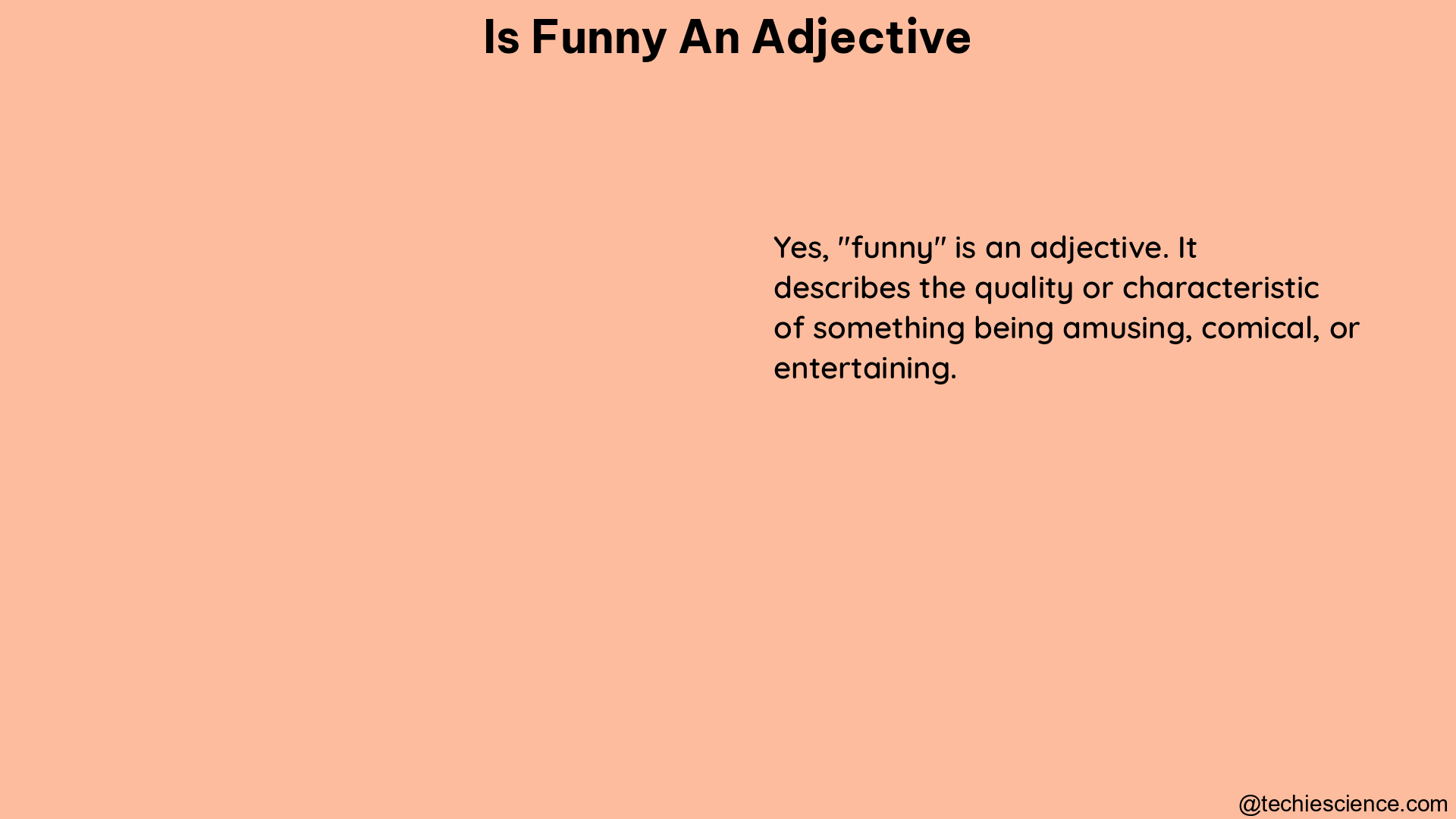Yes, “funny” is an adjective with several distinct meanings and applications in the English language. This comprehensive guide delves into the nuances of using “funny” as an adjective, providing a detailed exploration of its various usages, grammatical specifications, and illustrative examples.
Meaning and Usage of “Funny” as an Adjective
1. Causing Laughter
The primary meaning of “funny” as an adjective is to describe something that is amusing, comical, or entertaining, eliciting laughter or amusement from the observer. This usage is perhaps the most common and well-known application of the word. Examples include:
– “He told a funny story that had everyone in stitches.”
– “The movie was hilarious and funny, keeping the audience laughing throughout.”
– “Her witty remarks and comedic timing made her a very funny person to be around.”
2. Odd or Strange
“Funny” can also be used to describe something that is unusual, peculiar, or unexpected, often in a slightly negative or suspicious connotation. This usage implies that the subject matter is not quite right or normal. Examples include:
– “There’s something funny going on at the office, and I can’t quite put my finger on it.”
– “My car has been making a funny noise lately, and I’m not sure what’s causing it.”
– “The way he was acting during the meeting was a bit funny, and it made me wonder if he was hiding something.”
3. Not Well
In informal contexts, “funny” can be used to indicate that someone is feeling slightly ill or unwell, often in a vague or ambiguous manner. This usage suggests a mild discomfort or unease, rather than a severe medical condition. Examples include:
– “I’ve been feeling a bit funny all day, and I’m not sure why.”
– “My stomach feels funny after eating that questionable food, and I’m worried I might be getting sick.”
– “She said she was feeling funny and needed to lie down for a while.”
4. Dishonest or Deceptive
In certain contexts, “funny” can imply that something is not honest or is intended to deceive or mislead. This usage suggests an element of suspicion or distrust towards the subject matter. Examples include:
– “Don’t try anything funny during the exam, or you’ll be caught and face the consequences.”
– “There was some funny business going on during the auction, and I suspect the organizers were trying to rig the results.”
– “I don’t trust that salesman; there’s something funny about the way he’s presenting the deal.”
Grammatical Specifications

Comparative Form
The comparative form of “funny” is “funnier.”
– Example: “This joke is funnier than the one you told earlier.”
Superlative Form
The superlative form of “funny” is “funniest.”
– Example: “That was the funniest comedy routine I’ve ever seen.”
Adverb Form
The adverb form of “funny” is “funnily.”
– Example: “She told the story funnily, with great comedic timing and expression.”
Examples of “Funny” as an Adjective
- “He’s a very funny guy, always making us laugh with his witty remarks.”
- “That’s the funniest thing I’ve ever heard! I can’t stop laughing.”
- “The movie gets funnier and funnier as it progresses, with each scene more hilarious than the last.”
- “There’s something funny about the way he’s been acting lately, and I can’t quite figure out what it is.”
- “I’ve been feeling a bit funny all day, and I think I might need to see a doctor.”
- “Don’t try anything funny during the exam, or you’ll be disqualified.”
References
- Oxford Learners Dictionaries. (n.d.). Funny. Retrieved from https://www.oxfordlearnersdictionaries.com/us/definition/english/funny
- Cambridge Grammar. (n.d.). Fun or funny? Retrieved from https://dictionary.cambridge.org/us/grammar/british-grammar/fun-or-funny
- Britannica Dictionary. (n.d.). Funny. Retrieved from https://www.britannica.com/dictionary/funny
Hi… I am Sowndharya Jagadeeswaran, a university rank holder in M.A. English Literature. I have also done my master’s in Business Administration. Inquisitive as I am, my interest in action-oriented research helped me publish research papers in reputed journals. Now, as a career, I am an instructor where I teach young and adorable students the intricate technicalities of Public Speaking and Creative Writing. I also enjoy writing articles on topics I specialize and research in.
You can connect with me through LinkedIn.-